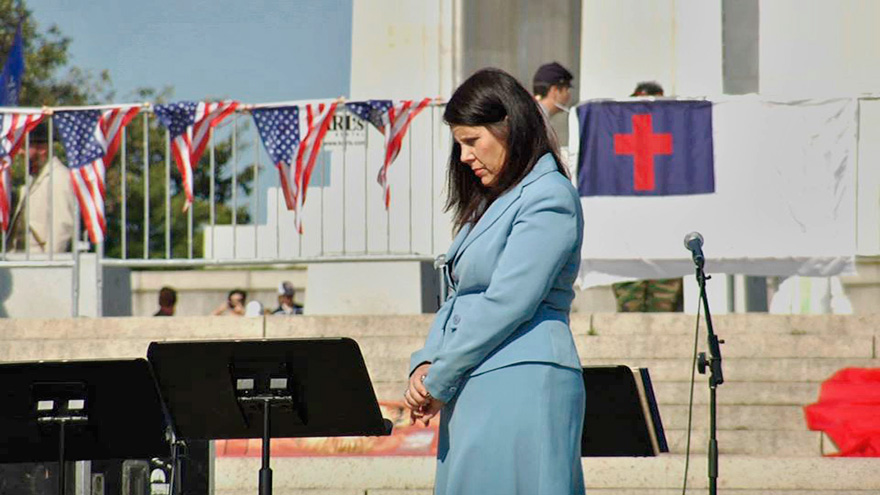By providing your information, you agree to our Terms of Use and our Privacy Policy. We use vendors that may also process your information to help provide our services. This site is protected by reCAPTCHA Enterprise and the Google Privacy Policy and Terms of Service apply.
Meet the 2012 Tribeca Filmmakers #21: ‘The Revisionaries’ Director Scott Thurman

 Religion is often tied into multiple aspects of American life and education is no exception. Especially in a state like Texas. Director Scott Thurman’s film, “The Revisionaries,” explores how religion and politics, for better or worse, are often tied together in determining the curriculum in that big old state.
Religion is often tied into multiple aspects of American life and education is no exception. Especially in a state like Texas. Director Scott Thurman’s film, “The Revisionaries,” explores how religion and politics, for better or worse, are often tied together in determining the curriculum in that big old state.
When tackling a hot button topic such as this, Thurman says that a particular challenge is trying to make a film that “the left and the right can embrace equally.” Thurman hopes to make Tribeca audiences aware of the complicated process that occurs when deciding public school curriculum and then have them make their own opinions on how it should be carried out.
What’s it about?: “The Revisionaries” is about the rise and fall of a small-town dentist, outspoken young earth creationist, and Chair of the Texas Board of Education during a crucial period in determining high-school textbook content for public schools throughout the entire state, which influences schools across the country.”
Director Thurman says: “We follow Don McLeroy as he cleans teeth, chairs plenary sessions, and teaches his 4th grade Sunday school class on subjects ranging from secular humanism to Noah’s ark. Opposed by Kathy Miller of the Texas Freedom Network and Ron Wetherington, an anthropology professor, Don challenges the theory of evolution and struggles to restore America’s Christian heritage in the Texas standards with the help of fellow conservative, Cynthia Dunbar, a professor of law at Liberty University.
“Revisionaries” was originally conceived while I was in grad school, but the documentary developed into a 4-year-long project spanning both the science and social studies curriculum standards adoption process. Originally I was covering the political issue around the science debates, but later, with the support of producers Pierson Silver and Orlando Wood and Executive Producer Vijay Dewan, I was pulled into the idea of covering the Social Studies debates after seeing several national stories about the controversy on the Texas Board of Education.”
On challenges: “The biggest challenge was to make a film that both the left and the right could embrace equally and feel that we have accurately represented them. Early feedback, thankfully, suggests we have achieved this.
“Making a living out of grad school while making myself available at all times to film with the main characters as important events in their lives and to my story came to my attention, and working through the hundreds of hours of footage, were of course the more usual challenges. Fortunately, editor Jawad Metni spent countless hours reviewing the footage, and arranged the structure of “Revisionaries” by weaving Don’s personal journey into the broader political issue. With the help of the aforementioned producers as well as Jim Butterworth, Daniel Chalfen, and Chandra Silver, we developed a character driven story about the politics of education in America.”
What would you like Tribeca audiences to come away with?: “I’d like Tribeca audiences to be more informed about how the Texas Board of Education’s political process occurs, and to better understand the motivation and strategies of a handful of characters with opposing worldviews involved in that process, which could affect all of our children.”
What inspired you when making this movie?: Since this is my first feature and has lasted about 4 years, it’s spanned most of my education in documentary film. The cinematographer, Zac Sprague and I were influenced by early observational docs like “Primary,” but later I also became interested in Errol Morris’ use of the interview as a storytelling device.
We’ve incorporated elements from each of these styles for “The Revisionaries,” but my desire to cover this particular issue came in part as a response to the film “Expelled.”
What do you hope to get out of the Tribeca experience?: “I’d like the Tribeca screening to serve as a launch pad of awareness about the role that religion plays in the Texas Board of Education’s political process, and hopefully spark audiences’ interest in learning more about their own state’s educational policies.”
Any future projects?: “There are a few topics I’m interested in learning more about, that may turn into documentaries. Several of them deal with science or religion, but I may venture from those themes in a doc/narrative portrait of an eccentric artist in west Texas.”
Indiewire invited Tribeca Film Festival directors to tell us about their films, including what inspired them, the challenges they faced and what they’re doing next. We’ll be publishing their responses leading up to the 2012 festival.
Keep checking HERE every day up to the launch for the latest profiles.
By providing your information, you agree to our Terms of Use and our Privacy Policy. We use vendors that may also process your information to help provide our services. This site is protected by reCAPTCHA Enterprise and the Google Privacy Policy and Terms of Service apply.


















